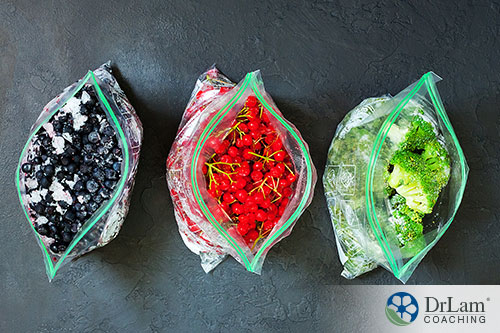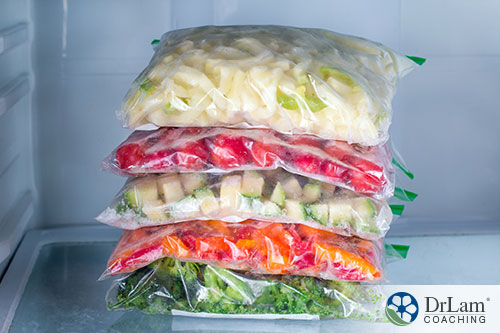 Consuming enough fruits and vegetables is one of the best things you can do for your nutrition. Some health protocols also emphasize a plant-based diet as part of the recovery process from some of the most serious diseases such as heart disease and cancer. But, it can be overwhelming to buy fresh produce all the time. So, many people ask: is freezing nutrients a viable alternative? In this article, we’ll talk about the various benefits and drawbacks of freezing nutrients, from a health and convenience perspective. We’ll also focus on how this process can influence your body’s core functions.
Consuming enough fruits and vegetables is one of the best things you can do for your nutrition. Some health protocols also emphasize a plant-based diet as part of the recovery process from some of the most serious diseases such as heart disease and cancer. But, it can be overwhelming to buy fresh produce all the time. So, many people ask: is freezing nutrients a viable alternative? In this article, we’ll talk about the various benefits and drawbacks of freezing nutrients, from a health and convenience perspective. We’ll also focus on how this process can influence your body’s core functions.
Antioxidants, prebiotics, and probiotics are found in abundance in fruits and vegetables, especially dark leafy greens, deeply colored produce, and fermented foods. Probiotics are also found in certain dairy products, such as yogurt.
Most health professionals recommend that you consume a diet that includes a lot of these foods in their fresh form. For example, the adrenal fatigue diet, which is the cornerstone of adrenal fatigue recovery, should compose of up to 40% vegetables (raw and cooked) and fruits.
Ideally, you should eat a lot of produce with almost every meal. This is useful not only for adrenal fatigue recovery but for your overall health all your life. Furthermore, we recommend that you try to eat as much organic produce as possible. This article will discuss the impacts that freezing has on different foods.
The NeuroEndoMetabolic (NEM) stress response is your body’s reaction to stress. The NEM consists of six circuits of organs and systems that work together to fight stress. The Inflammation Circuit is one of those, while the other five are the Hormone, Bioenergetics, Cardionomic, Neuroaffect, and Detoxification Circuits.
The Inflammation Circuit consists of your immune system, your gut, and your microbiome. That’s why many health experts say that inflammation almost always begins in the gut.
The microbiome is the collection of flora in your gut, and if it goes out of balance (a state called dysbiosis), that can lead to inflammation. How this usually happens is that:
One way to support the healing of the gut and microbiome is to eat a healthy diet full of antioxidants, prebiotics, and probiotics. Antioxidants assist in neutralizing free radicals and reducing oxidative stress. Prebiotics are found in fiber-rich foods, and they promote the growth of beneficial microorganisms in the microbiome. Probiotics are live microorganisms that fight the harmful bacteria to maintain balance in the microbiome.
 But what if you’re suffering from more advanced stages of adrenal fatigue? Adrenal Fatigue Syndrome (AFS) is a chronic condition that arises when your body faces chronic stress, such as chronic inflammation. Your adrenal glands are overworked trying to produce sufficient cortisol to cope. Eventually, your adrenal glands become exhausted, and you can suffer more advanced symptoms such as debilitating tiredness.
But what if you’re suffering from more advanced stages of adrenal fatigue? Adrenal Fatigue Syndrome (AFS) is a chronic condition that arises when your body faces chronic stress, such as chronic inflammation. Your adrenal glands are overworked trying to produce sufficient cortisol to cope. Eventually, your adrenal glands become exhausted, and you can suffer more advanced symptoms such as debilitating tiredness.
The extreme exhaustion is likely to make you unable to make the trips to the grocery store or farmer’s market each week to get fresh ingredients. For most people with advanced AFS, that can add to the stress that is already aggravating their condition. With adrenal fatigue symptoms, it might be hard to prepare fresh foods all the time, and that's why there is utility for frozen foods.
In such cases, keeping a stock of frozen fruits and vegetables in your freezer may not only be more convenient but more helpful for recovery. This is especially the case for the days when you’re more fatigued or stressed than usual. You don’t need to get everything frozen, as it would still be better to get fresh, local, in-season produce whenever possible. But, you should find a ratio that suits your needs and current state.
But there’s more good news! If you get high quality frozen fruits and vegetables, you may not be missing out on nutrients at all. Research has shown that if the process of freezing nutrients is done properly, the fruits and vegetables will remain nutritionally dense, and they are less likely to spoil.
Freezing nutrients yourself is a great idea if you’ve bought some fresh fruits and vegetables and realize that you have a surplus over your current needs. You want to try to avoid leaving them to the last minute when they’re stale and have lost most of their nutritional value.
Fruits and vegetables designated to be frozen are picked when they are at the peak of their ripeness. This is also their most nutritionally dense state. However, the process for freezing fruits is a little different than that of vegetables.
With fruits, they are frozen quickly and individually before being packaged in a nitrogen atmosphere. Nitrogen is what counteracts the degradation of nutrients that happens when they’re exposed to oxygen.
With vegetables, after they are picked, they are blanched in hot water before they are frozen. This blanching destroys the enzymes that turn vegetables brown and cause them to lose flavor. Some green leafy vegetables also undergo nitrogen exposure.
But, here’s where we run into the main drawback of freezing nutrients. Vegetables that are blanched will lose up to half of their vitamin C content. Vitamin C is one of the most powerful antioxidants and a crucial one in adrenal fatigue recovery. One of the highest concentrations of vitamin C in the body is in the adrenal glands, which is why it’s needed (sometimes in much higher doses than normal) during the recovery process.
The only way to counteract that loss is to ensure that you get enough vitamin C from other sources, such as from fresh fruits and vegetables, or by taking a supplement. Please do not take a supplement without medical supervision if you have AFS, as it can cause a paradoxical reaction.
Another tip for freezing vegetables that have lost a lot of their vitamin C is to squeeze some lemon or lime juice onto them after thawing and before cooking them. That can replenish their stores and replace what was lost.
Whether fresh or frozen, if you intend on cooking your produce, you should be aware that exposure to heat will also degrade their nutrients. For the most part, some nutrients become more bioavailable with cooking. We suggest lightly steaming them, as that cooking method has the least impact on the quality and concentration of their nutrients.
 Freezing nutrients of animal products, such as meat, fish, and broth can be quite convenient. Bone broth is especially good for the gut’s health, as it can help seal the leaks created in it’s lining from dysbiosis. This gives your immune system a break and reduces inflammation in the gut.
Freezing nutrients of animal products, such as meat, fish, and broth can be quite convenient. Bone broth is especially good for the gut’s health, as it can help seal the leaks created in it’s lining from dysbiosis. This gives your immune system a break and reduces inflammation in the gut.
Freezing nutrients is one of the very few ways to slow the production of histamine in food. If you aren’t going to eat it right away, it is usually better to freeze it instead of refrigerating it.
For even more convenience, you can cook certain foods or meals in batches and freeze them in single portions. This can help you avoid one of the biggest pitfalls for people in recovery. That is ordering fast food because they are too tired to shop for and cook fresh, healthy meals.
You should choose any practices (or shortcuts) that will help you stay on track with eating a healthy diet in the long-term. They are worth whatever small losses in nutrition that may incur. So don’t be afraid of freezing nutrients if that works well for your lifestyle and health condition.
For the most part, eating fresh fruits and vegetables is the best way to get your nutrients. But, if it’s becoming stressful to shop and chop that often, you can consider freezing nutrients as a great shortcut. In many cases, frozen produce is just as nutritionally dense as fresh ones.
